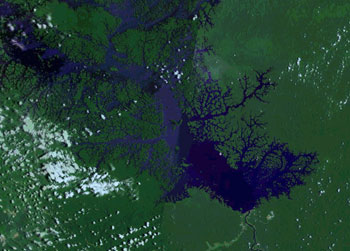The power outage that affected nearly a third of Brazil’s population Tuesday could be used by development interests to justify a renewed push for hydroelectric dams in the Amazon rainforest.
The power failure comes shortly after Rio de Janeiro was announced as the host city for the 2016 Olympic games and amid concerns that Brazil’s second-largest city doesn’t have the infrastructure to support a massive influx of visitors. The outage, while linked to faulty transmission and not a fall of energy supply, may fuel clamor to accelerate planned energy projects — and launch new ones — ahead of the games.
Hydroelectric power accounts for 14.7 percent of Brazil’s energy production and more than half of its electricity generation. Itaipú, the dam linked to the blackout, supplies about 20 percent of Brazil’s electricity and 90 percent of that consumed by Paraguay.
 Balbina dam outside Manaus, Brazil The Balbina dam flooded some 2,400 square kilometers (920 square miles) of rainforest when it was completed. |
Brazil has several major hydroelectric project planned or underway, including dams on the Xingu, Madeira, Tapajós, Tocantins, and other major tributaries of the Amazon. While environmentalists, biologists, and indigenous rights groups have opposed the projects due to social and ecological concerns, powerful development interests have lobbied hard for the dams. Much of the electricity would go towards energy-intensive mining, metal processing, and industrial farms in the Eastern Amazon.
The push for dams and other infrastructure projects in the Amazon led Brazil’s Environment Minister Marina Silva to resign last year from her post. She is now a presidential candidate for Brazil’s 2010 election.
Environmentalists say dams in the Amazon have flooded vast tracts of rainforest, releasing large volumes of greenhouse gases; blocked important routes for migratory fish; and promoted settlement projects that brought ranchers, soybean farmers, illegal gold miners and loggers to remote regions, driving deforestation.